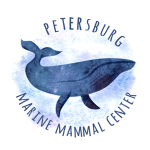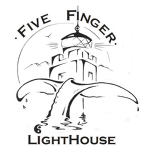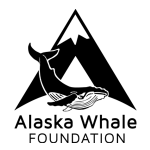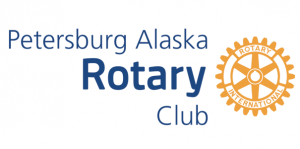Humpback whale in Frederick Sound (Photo by Kelly Bakos)
Ted Cheeseman, the co-founder and director of Happywhale—an online organization dedicated to matching whale fluke photos submitted by researchers and citizen science individuals—will be visiting Petersburg this month and sharing his insights about whale research. Holding a Master of Science in Conservation Biology from Duke University and having more than three decades of experience in the ecotourism industry, Ted has experienced firsthand the impacts of humans on the marine ecosystems.
Happywhale is fluke recognition software developed by Ted and others in the industry. It was born out of Ted’s desire to create an innovative citizen science program that would help scientists and marine enthusiasts better understand whales as individuals. Over the last seven years, Happywhale has played a critical role in matching and tracking the unique “fingerprints” on the underside of whale tails. These findings are used to determine movements of individual whales, who they are traveling and feeding with, when a female has a calf and how many whales use these waters to feed. By compiling thousands of these sightings, researchers are deepening our knowledge of humpbacks.
We look forward to welcoming Ted on May 18th at the Wright Auditorium to share his story and insights during his free public presentation, Whale Tales. In the meantime, Dennis Rogers, PMMC Board Member, presented Ted with some in-depth questions. Here’s a transcript of their Q&A session:
DENNIS: Prior to the inception of Happywhale and with your history involved with whale focused tourism, what did you see as the main impetus to create a unique whale identification and matching effort?
TED: For me… I went to South Georgia and Antarctica first in 1994. We saw NO large whales around South Georgia from 1994 through 2010. Then in 2011 we saw two humpbacks off St Andrews Bay. I about blew a hole in the roof of the bridge with excitement. This was where more whales were killed than anywhere on the planet. And… 100 years later… they started to return. Now it is common to see humpbacks around South Georgia. Witness to this all, I wanted to know more, firsthand and for what we were seeing to be part of contributing to science.
DENNIS: Many organizations and individuals have contributed marine mammal images to the Happywhale database. How successful do you consider the Happywhale development to date and the prospects to continue to amplify the knowledge of whale science?
TED: Well, had I known how successful this would be, perhaps I would not have jumped in. I thought this would be a fun and engaging project of a couple years and then, if it worked, hand it onward to some benefitting scientist. Here I am seven years later completely overwhelmed, but we have identified at this point above 60 or 70% — estimating conservatively because the statistics aren’t done yet — of living North Pacific humpbacks. In Southeast Alaska, it’s pretty hard to find an unknown whale. What I am most excited about, what feels like the strongest sign of success, is the active application to conservation science. For example, we assisted on a paper (Tackaberry et al 2022) looking at resight rates for entangled whales along the US west coast. Entanglements are deadly for whales, but they remain out of sight and out of mind unless we do this work.
DENNIS: Acknowledging Happywhale’s incredible development of humpback whale fluke recognition software, can you briefly describe the evolution of the efficiency of that program?
TED: To me it was obvious that we needed image recognition that could remove the bottleneck of time intensive manual image matching. Prior to our efforts there were some good systems that used image annotation to effectively narrow the search, but they required quite a bit of work to put an image in. We envisioned a no-touch input, basically taking any fluke photo, dropping it into a black box and getting an answer with high confidence. Through several iterations (details in our paper, Cheeseman et al 2021, the one chapter of my PhD thesis that is done) this improved and in March of 2019 after more than 2,100 teams contributed to a web-based algorithm development competition that Google’s Kaggle platform hosted, we nailed it. There’s been lots of work since then, like trimming it all down to building it into an app so scientists and naturalists can use WhaleID live in the field, but that’s the heart of it. That and building from there a global database of 66,000 known humpback whales!
DENNIS: What are your visions for the future of Happywhale?
TED: Well… So very, very much to do. The work is still going. Algorithm development to extend to many species. Repeating the process that brought us this gem, we’re working with Kaggle to develop a multi-species dorsal fin ID algorithm.
But in brief, the vision is a sustainable set of tools making marine mammal science accessible, powerful, fun and engaging. I’d like to see the platform find a home with a university or stable institution. I’d like to be a bit less on call all the time and knowing the same is necessary for Ken Southerland, the genius programmer really to be credited for all this. And most of all I’d like the ocean to be forever wild and free and safe for the leviathans and all their great kin.
Learn more during Ted’s Whale Tales presentation at 7pm on May 18th at the Wright Auditorium.
PMMC took a hiatus in public presentations during the pandemic. In 2022, we look forward to resuming the Petersburg Science Series. The kick-off will be during PMMC’s annual meeting on Wednesday, May 18th. We are hosting Happywhale founder Ted Cheeseman for a Whale Tales presentation at the Wright Auditorium. We also invited two other nonprofit organizations—Alaska Whale Foundation and Five Finger Lighthouse Society—to join us for the evening and share information about the work they are doing as well. Please put it on your calendar!
Wednesday, May 18th
Wright Auditorium
(Petersburg High School)
6:30pm:
Doors open and nonprofits will share information and handouts in the lobby
7:00pm-7:30pm:
Nonprofit presentations by Petersburg Marine Mammal Center, Alaska Whale Foundation and Five Finger Lighthouse Society
7:30pm:
Whale Tales presentation by Happywhale founder Ted Cheeseman
A big thank you to Petersburg Rotary Club for sponsoring this event!




Eric Castro throws the grapple during an entangled whale kegging simulation training session (Photo by Toby Bakos)
One morning last summer I went into the kitchen and found my wife Kelly dunking a GoPro in the sink. It had a cable attached that went to an iPad (which I was happy to see was not in the water) and I ventured “What in the world are you doing?” Things like this shouldn’t surprise me as she’s often doing things with video cameras that appear to me to be very strange, but she responded with “This is how we’re going to be able to see underwater in real-time.” Okay, very cool.
This ended up being an ingenious hands-on technique we practiced last September when to our delight Ed Lyman traveled to Petersburg to conduct marine mammal entanglement response training. Ed is the the Regional Large Whale Entanglement Response Coordinator for NOAA’s Marine Mammal Health and Stranding Response Program and is based in Hawaii at the Hawaiian Islands Humpback Whale National Marine Sanctuary. He is the foremost expert in our region for entanglement response so we again had the opportunity to learn from the best! This was the third training Ed has conducted with PMMC’s entanglement response team in the past nine years. Ten PMMC response team volunteers attended the training, including three new volunteers which we are excited to have on-board. In addition, two responders from Metlakatla took the opportunity to join us.
Entanglement response involves a series of steps, first and foremost is close coordination with NOAA’s marine mammal stranding program managers to determine what, if anything, could or should be done and how to do it safely. Entanglement response is inherently dangerous and training is critical.
After spending the morning in the classroom, we hit the water to practice hands-on techniques. And here’s where we get back to the GoPro/cable/iPad gizmo.
Simply cutting gear off large whales without knowing how it’s attached can leave lines wrapped around the pectoral fins, peduncle, or fluke that continue to dig in and restrict growth and movement, possibly causing further injury, infection, and death. Methodically determining which specific lines to cut is the key ingredient to successfully disentangling a whale. Only in the past few years has real-time underwater video technology developed to the point of helping with this foremost question – how is the gear attached and which line do we cut? Affix a GoPro to the end of a 20-foot long lightweight carbon-fiber pole, attach a long coaxial cable that goes to an iPad, and Voila! With some skillful boat and pole handling we now have a real-time view of how a line is attached!
Besides practicing with the GoPro/cable/iPad to view things in real-time underwater, we practiced the age-old method of kegging. It always makes me think of the original Jaws movie, but the same technique was used in historic whaling. Attaching additional gear to an entangled whale may sound counterintuitive. As a potential step in disentanglement though, this can include attachment of a satellite beacon to be able to track the whale’s location, attachment of buoys for visibility or to keep the whale at the surface and slow it so additional assessment of the entanglement can more safely proceed, or simply to create a longer control line that the disentanglement team can use to ‘walk up’ with a small dinghy in order to get closer to the entanglement.
To practice kegging a whale, we use a large buoy (the ‘whale’) trailing some line attached to a towing skiff, a rubber dinghy, and a fair amount of imagination. To sum it up, one of our volunteers Heath Whitacre said:
“The on-the-water training with the grapple highlighted some of the difficulties that could occur in a real situation. Timing, distance from the “whale,” line handling, and skiff size made it clear things could be much different with heavier seas. It was great when it all came together though! The day on the water definitely highlighted the value of practice!”
If you see a stranded, injured, entangled, or dead marine mammal, call the NOAA Fisheries Alaska Statewide 24-hour Stranding Hotline, (877) 925-7773. Petersburg Marine Mammal Center’s entanglement response team operates strictly under a permit from NOAA for any entanglement response activities. To volunteer in the Petersburg area, contact Toby Bakos, PMMC’s Stranding Coordinator (907-650-7325).
The on-the-water training with the grapple highlighted some of the difficulties that could occur in a real situation. Timing, distance from the “whale,” line handling, and skiff size made it clear things could be much different with heavier seas. It was great when it all came together though! The day on the water definitely highlighted the value of practice!
Heath Whitacre looks underwater using virtual reality glasses attached to a GoPro on a pole
(Photo by Toby Bakos)
At the end of September a humpback whale was spotted by PMMC board member Dennis Rogers from his vessel Northern Song near Pinta Rocks trailing a line with a series of buoys attached. The whale was observed traveling slowly and was not diving. In close coordination with NOAA Fisheries, PMMC’s marine mammal entanglement response team attempted to relocate the whale the next day. The timing of this event was soon after our training and our skills were primed for success. Entanglement in marine debris and fishing gear is an important source of fatality in marine mammals in Alaska, particularly for large whales. Unfortunately despite three vessels searching the whole day in good conditions throughout much of Frederick Sound, the whale could not be relocated. No further sightings of the whale were reported.
A deceased humpback whale was found beached on a shoreline in Frederick Sound less than two weeks later but this was confirmed to be a different whale. A NOAA Fisheries team planned to conduct a necropsy of the beached whale but a timely necropsy could not be conducted due to inclement October weather.
PMMC is an active member of the Alaska Marine Mammal Stranding Network, operating under agreement with NOAA Fisheries (Stranding Agreement Number SA-AKR-2022-09) and draws on a team of trained volunteers to assist marine mammals in distress. Please report stranded, injured, entangled or dead marine mammals 24/7 to NOAA Fisheries 1-877-925-7773.
Want to keep the Alaska Stranding Network emergency phone number handy in your wheelhouse? PMMC is distributing these 4″ water resistant vinyl stickers. Reach out to a board member or email us to get one.
PMMC Wheelhouse Stranding Network Sticker
Hiking and learning telemetry during summer camp (Photo by Sunny Rice)
Summer Science Camp returned to an in-person format last summer, but with a few changes. Each day, we met outside at Sandy Beach Park and spent all day outdoors (hot drinks were available when we got cold). In addition to the wonderful day we spent whale watching with Scott Roberge aboard the Tongass Jem, highlights included an exciting afternoon bushwhacking up the creek that ends at Sandy Beach with USFS hydrologist Emil Tucker, exploring an amazing array of mushrooms and other fungus along the Sandy Beach trail, and identifying intertidal life with ADF&G biologist Tessa Bergmann. Thank you to the Petersburg Public Library, Parks and Recreation, and the Petersburg City Schools, and all the volunteer instructors for their help.
UPCOMING 2022 SCIENCE CAMP
This year we are excited to receive funding from the Alaska Community Foundation’s 2022 Camp Initiative Grant to help us expand our Summer Science Camp. The grant will allow us to hire an additional charter vessel (in addition to the one already donated by PMMC members) to get the kids out on the water observing marine mammals. This will double our number of campers from 5 to 10. We will also be able to purchase updated water sampling equipment and better equip our campers with waterproof science notebooks. Sincere thanks to the Alaska Community Foundation for their generosity!
Student applications for our 2022 camp will be opening soon! We will be accepting applications from students entering 6th-8th grade. Watch out for notices on our Facebook page and website, or reach out to Sunny Rice (sunny.rice@alaska.edu). Camp will run August 8-12, 2022.
PMMC’s new website and Virtual Aquarium
Did you notice PMMC launched a new website? We changed our domain name, too. Our new URL is easy to remember: PetersburgMarineMammal.org
Last year the Alaska Community Foundation awarded PMMC a generous grant for developing a new website. We invite you to explore the deep depths of the site! You’ll find lots of new content and multimedia elements including:
~ Details about our marine mammal stranding, education and outreach programs.
~ Streaming and playback capability of all future Petersburg Science Series presentations as well as the archive of Frederick Soundings—our three-minute dynamic educational radio series.
~ A Virtual Aquarium, which is a multimedia compilation of marine science information via educational videos, audio clips, photographs, lessons, activities, related research, lectures and information links. We are still filling out and expanding the Virtual Aquarium, but check out our progress in the Marine Mammal section.
~Membership and donation pages where you can safely renew memberships, become a new member and make one-time or recurring donations.
The Petersburg Marine Mammal Center is a registered
501 (c)(3) nonprofit organization